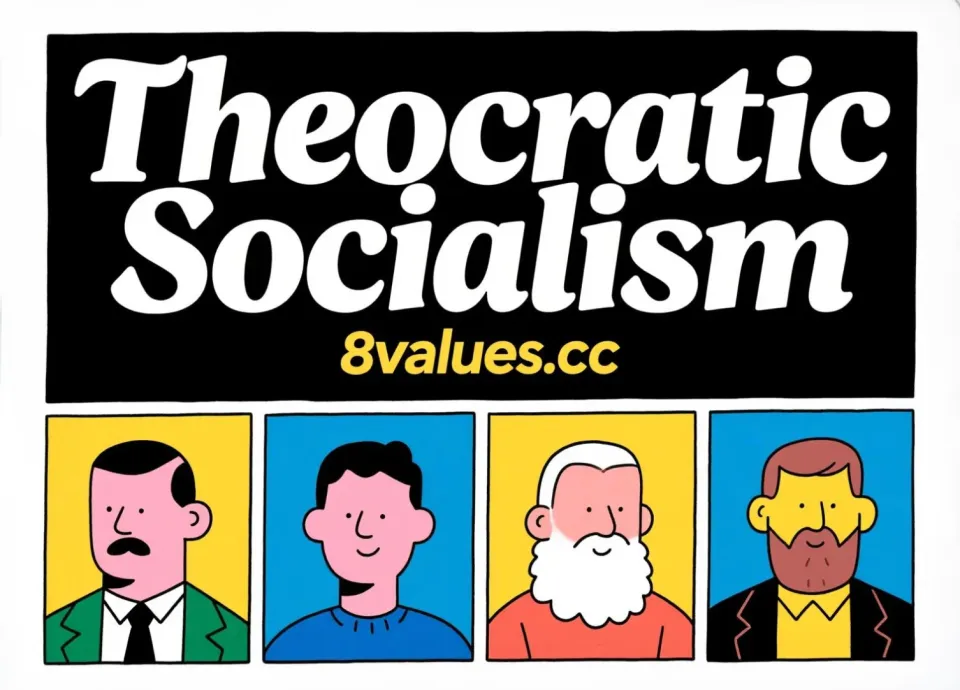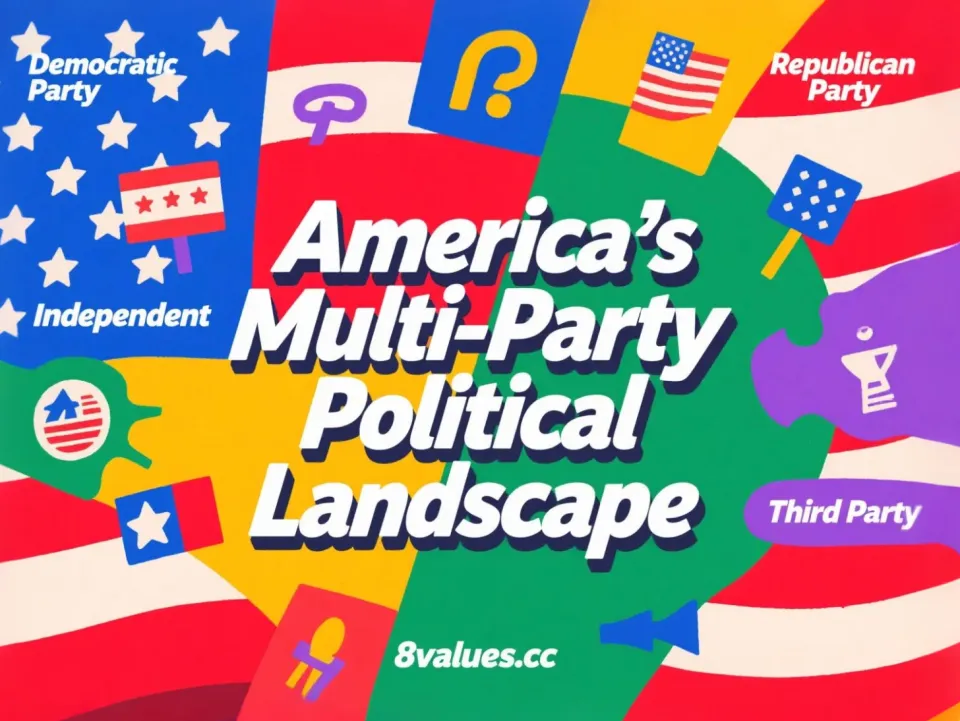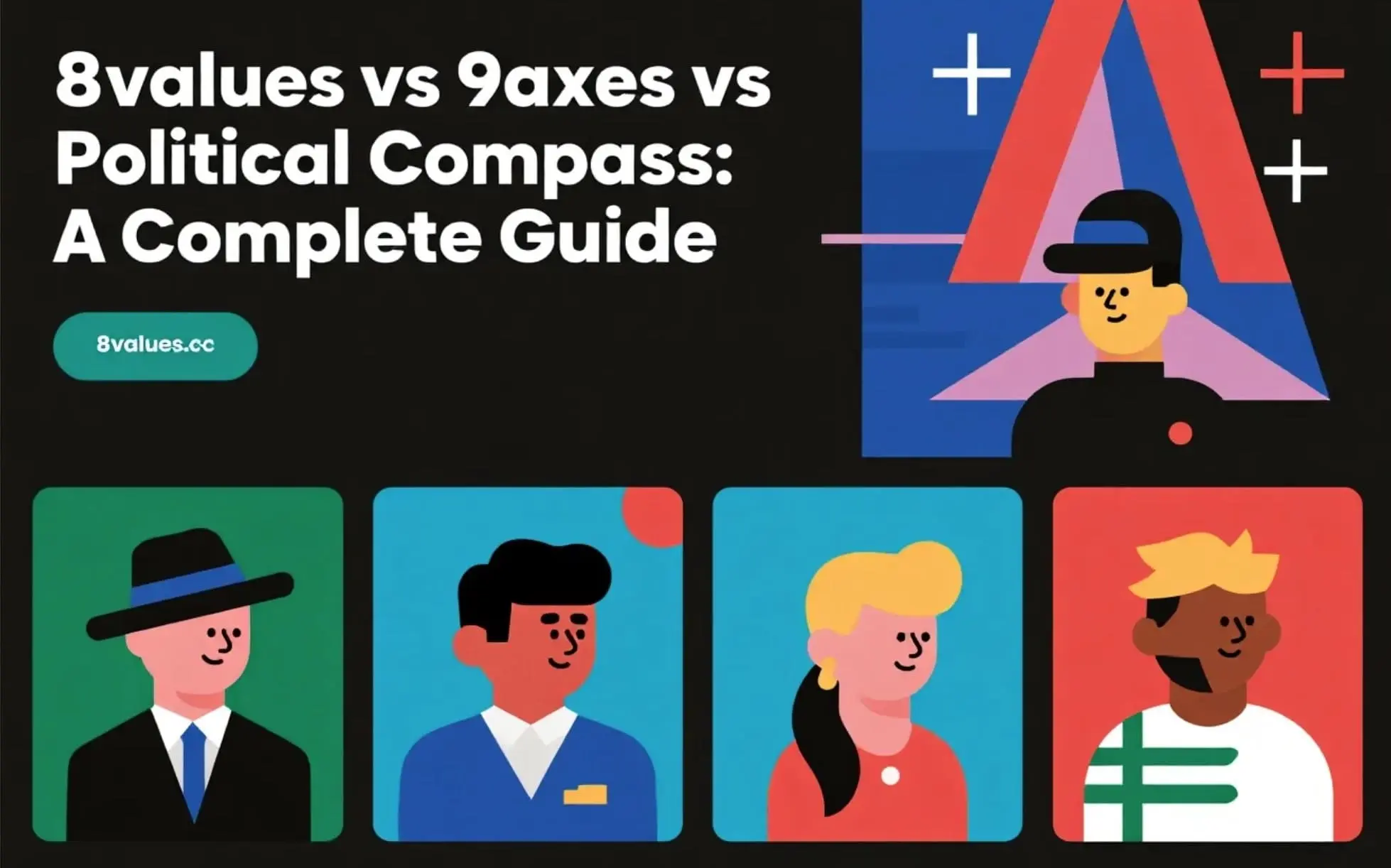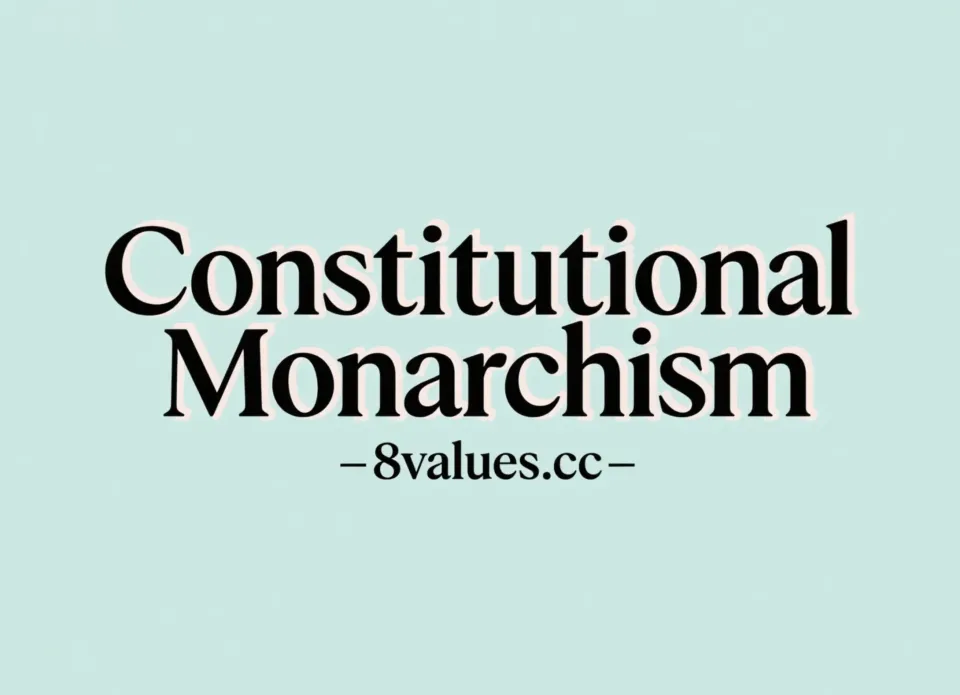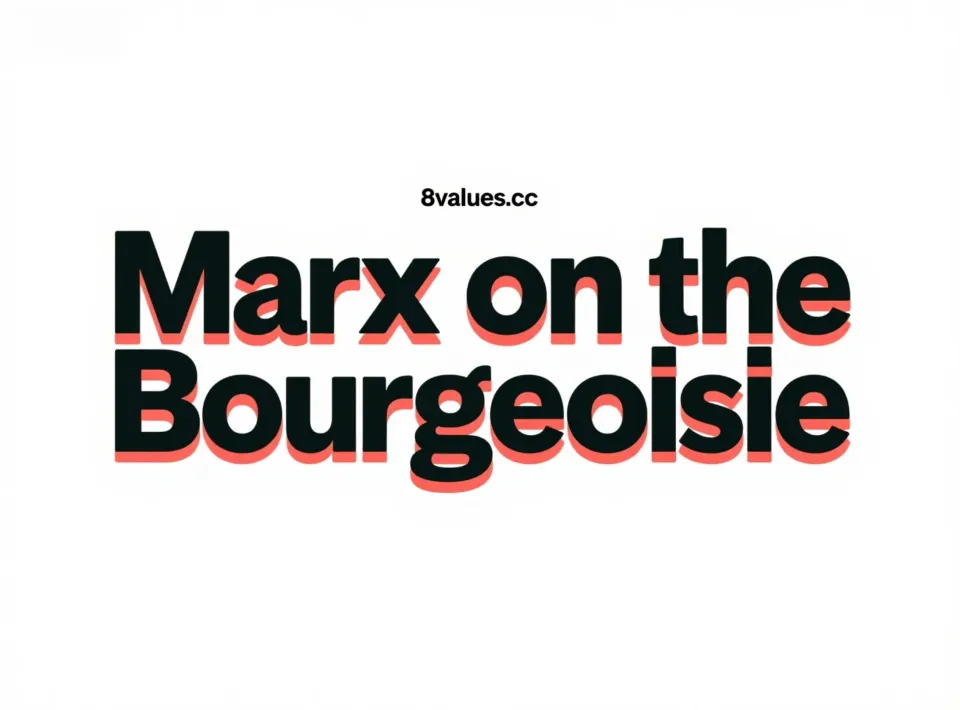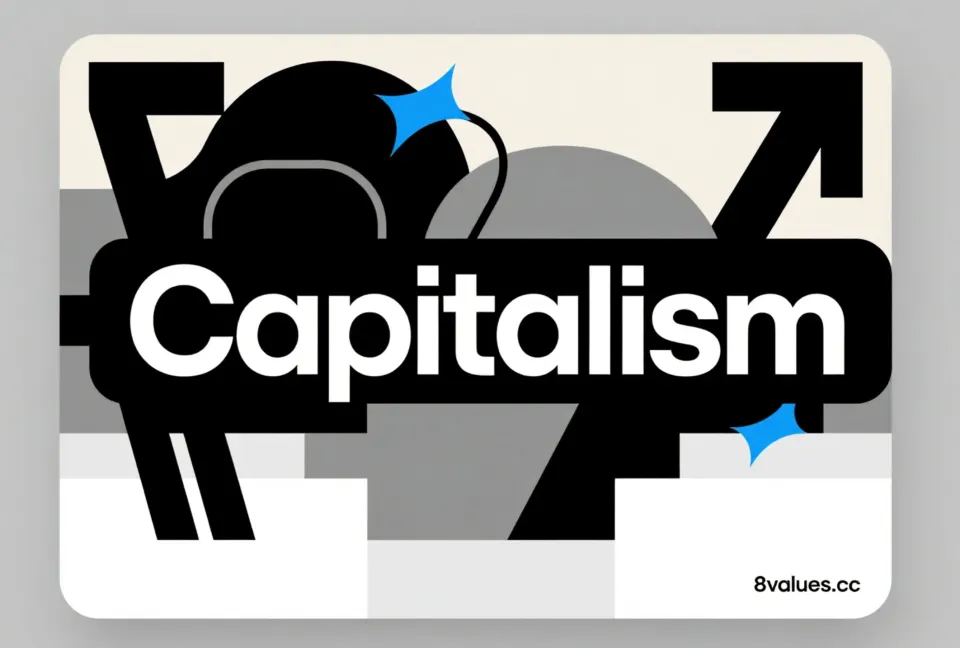Theocratic Socialism | 8values Interpretation of ideological ideology in political tests
In-depth interpretation of the Theocratic Socialism ideology in the results of the 8values political tendency test. This article explores the core principles of theocratic socialism, historical practice, the difference from religious socialism and Marxism, as well as the challenges and controversies it faces, and helps you fully understand this political idea that integrates religious authority with socialist economic concepts.
Theocratic Socialism is a thought-provoking and often controversial concept in the vast picture of political ideology. It is not a standard term that is generally independently defined or widely accepted in the mainstream political science community, but is more like a collection of political and economic ideas or practices that integrate the two core concepts of "theocracy" and "socialism". This unique combination attempts to achieve the goals of economic equality and social justice pursued by socialism under the highest framework of religious authority. In the 8 values political orientation test , Theocratic Socialism, as a possible test result, represents this complex and diverse dimension of thinking. This article will thoroughly analyze everything about theorectical socialism and help readers better understand this ideology.
The definition and core characteristics of theocratic socialism
Theocratic Socialism, sometimes called theocratic communalism, Ultra-Religious Socialism, or theo-Socialism/TheoSoc, is a political ideology that deeply integrates religious beliefs with socialist ideas. Its core feature is the realization of social equality and justice through theories.
The essence of Theocracy
"Theocratic power" refers to the fact that political power comes directly from religious authority, and national laws and governance are based on religious doctrines. Under this system, state leaders are often religious figures, or their power is determined by religious institutions, and political legitimacy comes from "Divine Revelation" or "God's Will." The historical papal state and the current Islamic Republic of Iran (with a certain degree of theological characteristics) are classic examples.
The pursuit of socialism
"Socialism" emphasizes social or state ownership of economic equality, social welfare, means of production, and the goal is to reduce the gap between the rich and the poor, safeguard public interests and social justice. Its forms are diverse and cover a wide range of genealogies from democratic socialism to Marxist socialism.
The embodiment of the integration of the two: theocratic socialism
Combining theories with socialism means implementing a social system with socialist characteristics under the framework of the highest authority of religion. Religious doctrines not only guide morality and law, but also directly guide economic distribution and social policy. The government may argue that wealth is a gift from God and should be distributed fairly, emphasizing the equality of public welfare and the "community of believers."
The core principle of theocratic socialism is to regard religion as a tool for social change rather than a mere personal belief, and its claims include:
- Economic Equality and Religious Ethics : Public or collective control of property, realizing wealth redistribution based on religious doctrines (such as the “shared property” of Christianity or the “Zakat” charitable tax of Islam). Socialism is seen as a way to achieve a “kingdom of God” or religious utopia.
- Theocratic governance and political power : The government is dominated by religious leaders or institutions, and decision-making must be in line with the divine doctrine, which takes precedence over the secular constitution. This "sacred" social integration sanctifies the economic order through religious rituals, doctrines and hierarchies, making it unquestionable.
- Social Cooperation and Community Spirit : Emphasizes that human beings are not isolated individuals, but produce and socially share their results through cooperative cooperation between religious communities. Social welfare systems and public policies are often marked by religious ethics, such as emphasizing charity and community responsibility.
Analysis of theocratic socialism and related concepts
To better understand Theocratic Socialism, we need to distinguish it from some confusing concepts.
Differences from Religious Socialism
Theocratic socialism, while similar to the broader "religious socialism", has key differences.
| Dimension | Theocratic socialism | Religious Socialism |
|---|---|---|
| Power structure | Religious leaders directly control state power | Religious influences policies, but does not directly rule |
| Legal Source | Religious law is national law | National laws can be inspired by religious ethics, but not divine rights |
| Typical examples | Iran's regime after Islamic revolution (partial characteristics) | Latin American liberation theology, Christian socialism |
Religious socialism is more inclined to combine religious values with socialist ethics, advocate social justice based on religious ethics, poverty alleviation and weakening and property sharing, which can be regarded as a kind of "moralized socialism", but it does not necessarily establish a theocracy system, nor does it necessarily fully implement a planned economy.
The fundamental difference from Marxist socialism
Traditional Marxism regards religion as "the people's opium" and emphasizes atheism and class struggle. Theocratic socialism takes "God's will" as the highest basis for social equality, and the two have fundamental contradictions in philosophical basis and methodological methods. Marxism is committed to a thorough social equality and a classless society, emphasizing a social system without religious intervention, while theocratic socialism believes that religious doctrine can guide society to develop in the direction of fairness and equality.
Relationship and rebuttal to Communal Nationalism
Some viewpoints that Theocratic Socialism is related to Communal Nationalism, and even regards it as a primitive version of communal nationalism. However, theocratic socialists are critical of this, considering it a "scarecrow fallacy" attack, insisting that they are neither fascists nor communists. However, there are also some factions within this ideology, which advocate that theocracy and communism can coexist, and that a society without state and class can be formed on a religious basis.
History and Practical Cases of Theocratic Socialism
Although "Theocratic Socialism" itself is not a generally recognized independent ideology, its ideological tendencies and practices appear in many forms throughout history, spanning different religious and cultural backgrounds.
Early prototypes and germination of thoughts
Theocratic socialism was not a modern invention, and its roots can be traced back to the early Reformation and intertwined with the socialist waves during the Industrial Revolution.
- Ancient Temple Economy : The temple economy of the Sumerian city-state is regarded as one of the early prototypes, and the priestly class controlled the allocation of large amounts of land and resources and claimed that this was "God-given order." The temples in the Mesopotamian Basin even occupy 70% of the land. The tenant farmers farmed as "god servants" and the fruits of their labor were handed over to the temple.
- 17th-century British Diggers : They regard land sharing as a sacred mission.
- 19th Century Christian Socialism : Some early Christian socialist movements in Britain and the United States were inspired by the doctrine of Jesus, opposed capitalist exploitation, and emphasized the promotion of social reform and economic equity through faith. For example, Félicité de Lamennais in the 1830s advocated a kind of Christian socialism, advocated that the state should have spiritual authority and establish a socialist order based on Christian principles. Early Christian communities practice property sharing, which is also regarded as a manifestation of primitive socialism.
Modern Practice and Complex Cases
In the modern context, some countries or movements show the characteristics of the combination of theocracy and socialism, but they are often complex hybrids rather than purely theocracy socialist regimes.
- Holy Peasants' Republic of Gräntierik : described as "the only explicitly claimed theocratic socialist state on the planet Urte". The country takes the Ademarism of the Luterites as its national ideology, and its founder Borko Luter developed the belief in primitive socialism based on "true equality under the divine power".
- Islamic Republic of Iran : The regime established after the Islamic Revolution in 1979 is widely regarded as a typical case of theological socialist qualities. Khomeini's Velayat-e Faqih theory combines the authority of religious leaders with political rule, while promoting anti-capitalist social reforms. The government leads the allocation of resources and implements nationalization and welfare policies for key industries, such as establishing free medical care, education and other welfare systems through religious taxation ("Zhaika") and oil income.
- Latin American liberation theology : It combines Christianity and socialist thought, emphasizes the struggle for social justice for the poor, criticizes capitalist exploitation, and has a socialist color.
- Islamic Socialism : A variation of the Middle East and North Africa in the 20th century, attempting to combine the principle of equality of the Quran with state-owned economies such as the Gaddafi regime in Libya. The Bashir regime of the Islamic Mahdi Movement in Sudan (1989-2019) also implemented nationalization policies in the name of "Islamic Socialism".
- Akronist Socialism : In Akronism, Theo-Socialism appeared as early as the late 19th century, emphasizing the absolute equality of all people, the right to live with dignity, and the assistance to the poor. Since the 21st century, Akroist socialism has become the dominant philosophy of political Akroists, and after its amendment in 2021, the constitution of the Tavari Communist Party clearly defines it as "Akroist socialist or theocratic socialist proletarian political organization", combining the moral principles of Akroism with the economic principles of Marxism. It also exists in Ekvatora and Vesienväl, the former having compromised within the government and the latter providing important social services through the church.
- Ernok Revival in Ulvriktru : This is a branch of the National Frontier of Workers in Durakia, advocating a radical return to traditional Urvriktru social practice while maintaining Durakia's economic system, with a transnationalist tendency and sometimes blurred boundaries with commune nationalism.
- The Cult of Martov : A deist sect in Durakia, known as theocratic socialism because of its totalitarian social order to control desires and worship of left-wing principles. There is controversy within the sect regarding whether to accept the title of theocratic socialism.
- Milishism : Durdanini's state religion, which has been associated with Theo-Socialism since its independence, as it blends theo-Socialism with democracy, laying the foundation for the belief in theo-Socialism in the urban population of the country. In Maankijkeland, the Torch of Emancipation, which represents the Durdish minority, also actively advocates theocratic socialist Milichism.
- Duarism : In Duarism, although several organizations have the nature of theocratic socialism, only a few will explicitly call themselves theocratic socialists. These organizations tend to align with the broader left-wing movements in terms of economic distribution and social justice, such as building more religious places for Duaist religion. Briaklandr's Prime Minister Sigurd Vesgard, though he calls himself a social democrat, also incorporates left-wing ideas with Duaist religious beliefs, such as increasing funding for Duaist churches and working with religious figures to ensure welfare for all. However, Noraida's leadership has called itself theocratic socialist state but has been rejected by many theocratic socialists overseas for its alliance with armed forces seen as non-political, extreme hostility to religious minorities, trans-fear policies, and maternal social hierarchy.
Theocratic socialist thought in other religions
Theo-Socialists believe that many religions and their doctrines are essentially consistent with their ideology, even if they are not directly named Theo-Socialists. For example, Tunseism is considered a religion that embodies the concept of theocratic socialism and equality. The Cult of Fortuna has attracted the attention of theocratic socialists for its growing influence after the history of oppression and persecution.
If you are interested in these complex ideologies, try eight values: Self-testing of political ideological tendencies , which can help you better understand your political stance and the nuances of these ideologies.
Challenges and theoretical controversy in theology of theocratic socialism
Theocratic Socialism, as a theory that combines religious authority with the concept of socialism, faces many challenges in practice and has been severely criticized from different political positions.
Criticism from the secular left
Secular socialists, especially Marxists, generally believe that introducing religion into social systems will distract from class struggle and may lead to revisionism or autocracy. They viewed theocratic socialism as a "smudge" of socialist ideas, and even pointed out that it may form a "Clerical Bourgeoisie" under religious constraints, controlling the proletariat through means of production. Some commentators believe that Theocratic Socialism may face controversy similar to Marx's criticism of "feudal socialism" because of religious authority suppressing the democratic process. The lessons of the alienation of public ownership by bureaucratic privileges in the late Soviet Union also warned that the combination of theocracy and power may give birth to "official ownership" rather than real public ownership.
Worries from the right and liberals
Religious conservatives may regard theocratic socialism as a "tampering" of pure theology. Liberals, on the other hand, fear that it will evolve into totalitarianism, especially when combined with nationalism, is seen as a hybrid of "ultimate totalitarianism." Theocratic socialism is often accused of "acting autocratic reality in the name of divineness" and suppressing freedom of belief and political diversity. Deep binding of religion to state governance may lead to dogmatism and suppression of dissent, conflicting with the principles of democratic freedom. Noraida's self-proclaimed theocratic socialist state has been widely criticized and rejected for its extreme hostility to religious minorities, trans-fear policies and maternal social hierarchy.
Issues of theoretical compatibility and practical feasibility
In theory, socialism is usually atheistic or secularist, while theocratic politics relies on supernatural authority and religious beliefs. This internal contradiction causes the two to have fundamental conflicts on a philosophical basis. Comments point out that it is difficult to find pure form of regime in reality by Theocratic Socialism, and most so-called examples have a mixture of complex historical backgrounds and multiple ideologies. In addition, different people's interpretations of religious classics may lead to very different understandings of "fairness" and "justice" and even lead to internal conflicts.
The risk of power concentration and system collapse
The practice of theocratic socialism is often controversial because of its concentration of power. Iran's practice shows that it may face the phenomenon of "schizophrenia": on the one hand, it claims anti-capitalism, and on the other hand, it relies on religious elites to monopolize power, leading to social conflicts. The root of the collapse of this system lies in the breakdown of "sacred legitimacy" and "material basis" - when material crises impact beliefs, class solidification violate the promise of "equality" or technological progress breaks the "sacred enlightenment" monopoly, religious authority will decline and social contradictions will intensify. For example, due to defeat and famine in the late Taiping Heavenly Kingdom, the people's belief in "God's blessing" collapsed, and the system eventually collapsed.
Summary: The complex face of theocratic socialism
Theocratic Socialism is a complex hybrid ideology that combines religious domination with economic equality. It stitches the "sacred order" of religion with the "equal distribution" of socialism, but the price is often that faith is unquestionable and power is not allowed to be elected .
Overall, Theocratic Socialism represents an attempt to integrate religion and left-wing thought, inspiring social reforms in history. It appears more in thought experiments, theoretical criticism or individual political movements than in a generally recognized, stable, and institutionalized political system. It provides a unique perspective on the power of faith as a tool rather than a barrier to achieving social justice.
By understanding these complex dimensions of theocratic socialism, we can have a deeper understanding of the diversity and inner tension of political ideology. If you want to explore more ideology, visit the 8values All Results Ideology page, or do the 8values political orientation test now to discover your political positioning. Also, follow our official blog for more in-depth discussions and latest insights on political and philosophical topics.
